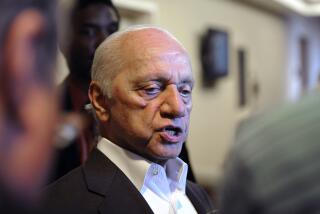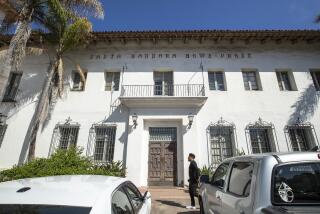Freedom Looks to Expand, but Problems Linger
After being freed Tuesday from the hammerlock applied for the last seven years by dissident heir Harry H. Hoiles, Freedom Newspapers Inc. plans to move boldly in the media world to boost its circulation and add to its empire.
But as the media chain grows, so will the three branches of the family spawned by founder R. C. Hoiles. And the family members still have to come to grips with the same problems that landed them in the roiling stew that resulted in Hoiles’ attempt to dissolve the company.
That bid ended Tuesday when an Orange County judge ruled that Hoiles failed to prove his case. Whether the family feud will end as well is unknown.
“When you really analyze the situation, we’re right back where we started,” Freedom President D. Robert Segal said in an interview after the court ruling Tuesday.
“We have the same players, the same format, the same rules. What we have to hope for is that the people will play within that format--or agree among themselves to change it.”
The company expects to flex its financial muscle by seeking to acquire more newspapers and TV stations, lawyers and family members said.
Freedom Newspapers owns or operates five TV stations and 29 newspapers, including its flagship, the Orange County Register. It is the 14th-largest newspaper chain in the nation and the nation’s 269th-largest private company, with $322 million in sales and 3,800 employees.
The company was appraised at more than $600 million in early 1981, and Hoiles valued its assets at nearly $1.1 billion when he offered in October, 1985, to buy out the families of his sister, Mary Jane Hoiles Hardie, and his late brother, Clarence H. Hoiles.
The company is relatively debt-free, according to testimony in the six-month trial, and has quickly paid off the loans for the five TV stations it bought in the first half of the 1980s.
Segal--the first president, director and executive committee member from outside the Hoiles clan--said he hopes that the directors and the three members of the executive committee, which operates the company, can begin to make business decisions themselves, instead of running to lawyers, as they have in the Hoiles suit, to see what effect some action might have.
The directors had reason to worry: Harry Hoiles was always poised for court action.
In January, 1984, he sought a court order prohibiting the company from buying two TV stations, expanding the Register’s facilities and building a new corporate headquarters in Irvine.
He alleged, among other things, that the majority was wasting assets, a third of which would have gone to him had he won his lawsuit. The court ruled against him then, too.
As the company grows, the families also have to devise some formula that would allow shareholders to sell their stock at a fair price to other shareholders or to the company.
The families--including Hoiles, according to his testimony--do not want to sell to outsiders.
Industry analysts have said that family-owned companies historically fall prey to public companies because new generations of family members inherit less stock and have little influence in corporate affairs because of their diluted ownership. That frustration creates a desire to sell out.
R. David Threshie, Clarence’s son-in-law and publisher of the Register, recognized the problem in a September, 1981, letter to his father-in-law and the Hardies:
A “major contributing factor” to the feud, he wrote, “is anger that results from the frustration of being locked in a situation where you have no way of getting out, short of forfeiting the bulk of value of your assets if you disagree with what the majority is doing.”
However, a formula Threshie suggested for paying off those who want to leave never gained the approval of other family members, although a stock restriction agreement signed by the Hardie and the Clarence Hoiles families does give the company and each family member the right to match any outside offer a dissident gets.
CHRONOLOGY OF A FAMILY FEUD
Oct., 31, 1970--Freedom Newspapers founder R. C. Hoiles dies. His surviving children, sons Harry and Clarence and daughter Mary Jane Hoiles Hardie, revamp the publishing company to ensure equal voting power.
Oct. 30, 1978--D. Robert Segal selected as first non-family president of Freedom Newspapers.
March 3, 1981--Post of chief executive officer abolished over Harry Hoiles’ objections. Management powers vested in a three-member executive committee.
Sept. 26, 1981--In response to his repeated proposals to withdraw from the company, the other families offer Harry $74.1 million for his family’s shares--about 70% less than appraised value of the company.
Dec. 31, 1981--Clarence Hoiles dies.
Feb. 8, 1982--Board majority refuses to elect Harry to executive committee.
April 14, 1982--Harry and his family file suit to dissolve Freedom Newspapers.
Jan. 25, 1984--Harry loses bid to stop Freedom Newspapers from building new corporate headquarters in Irvine, expanding facilities of the Orange County Register and buying two television stations.
Dec. 10, 1986--Trial begins on Harry’s suit to dissolve Freedom Newspapers.
June 2, 1987--Superior Court Judge Leonard Goldstein rules that Harry failed to prove his case.
More to Read
Inside the business of entertainment
The Wide Shot brings you news, analysis and insights on everything from streaming wars to production — and what it all means for the future.
You may occasionally receive promotional content from the Los Angeles Times.










